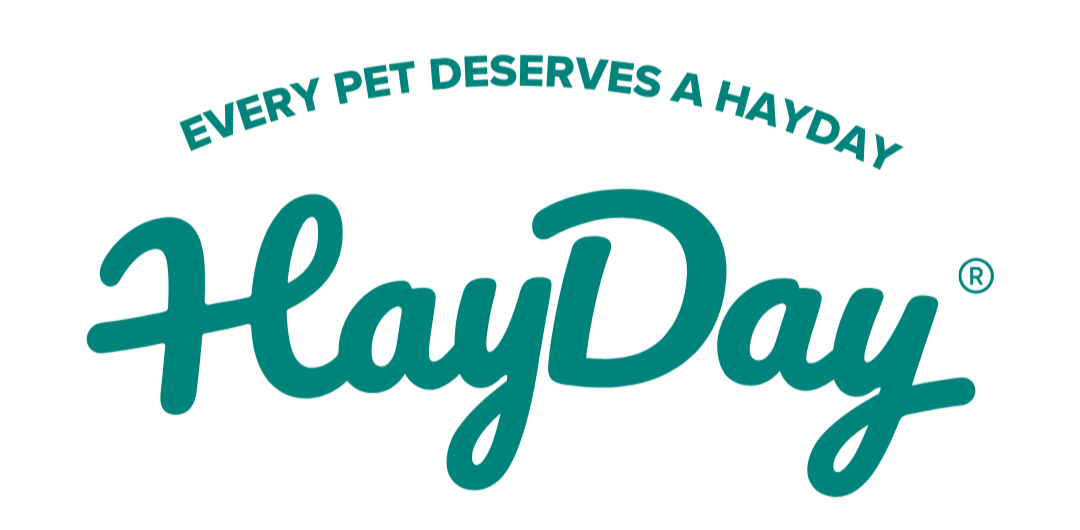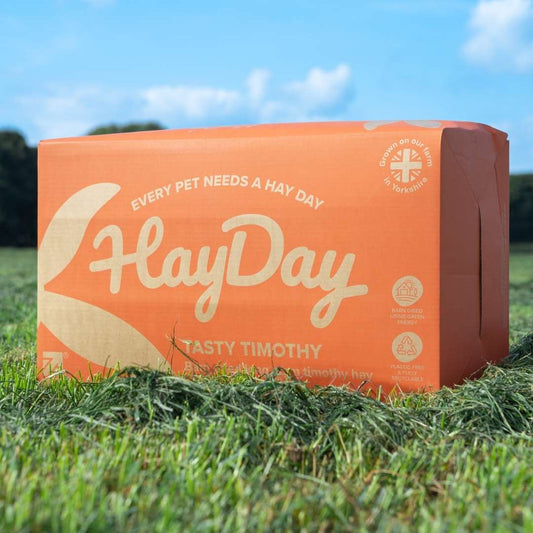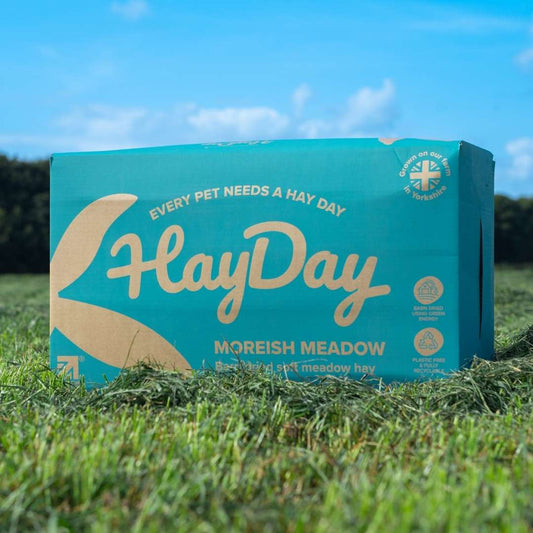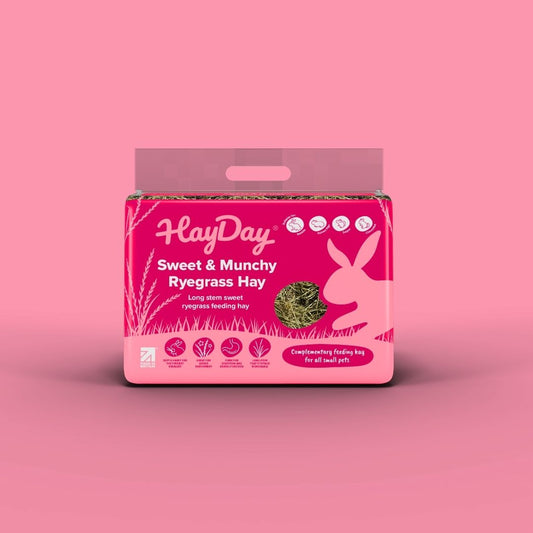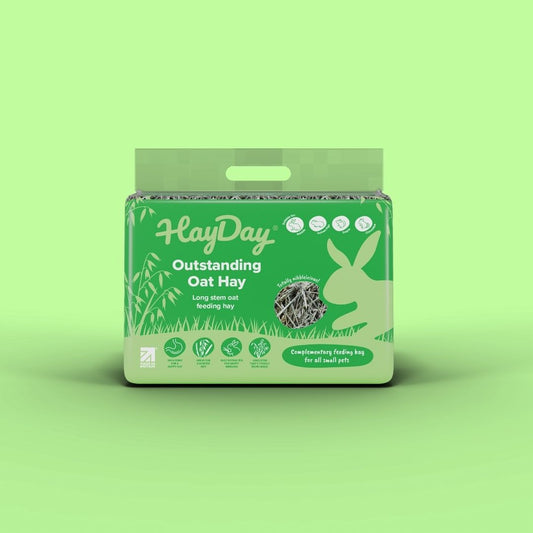Whether you're new to owning rabbits or just brushing up on a new item of food you have forgotten about, identifying what human food rabbits can eat is always important for their health and well-being.
This article from hay specialists at HayDay cuts through the confusion with a practical list of safe foods, including vegetables, fruits and greens, to ensure your rabbit’s diet is both enjoyable, nutritious and diverse. Here's our guide on “what can rabbits eat” and what to skip for your rabbit’s health and wellness.
The safest food for rabbits is top quality hay > Shop our rabbit hay here.
What Can Rabbits Eat? - Overview
-
Rabbits are herbivores, and their diet should mainly include fresh hay, pellets and leafy greens. Certain human foods for rabbits like fruits can supplement their diet, but it’s best to know which ones are safe and in what quantities.
-
A balanced diet is essential for rabbit health, to prevent obesity and digestive problems such as GI Stasis. Overindulgence in sugary treats can lead to health issues, so keep fruit servings small and infrequent.
-
Always introduce new foods to a rabbit’s diet gradually over a period of 7 to 14 days to avoid upsetting their digestive system. Similarly, ensure constant access to fresh water as it is vital for hydration and their overall wellbeing.
Human Foods That Are Rabbit-Safe
When it comes to feeding your rabbit and what they're allowed to eat, it’s essential to know which human foods are bunny-approved.
While some foods are perfectly safe for rabbits to munch on, others may pose a considerable risk to their health. Identifying these foods is key to ensuring your rabbit receives adequate nutrition without any health risks.
As a pet rabbit owner, it’s important to know what rabbits eat. Their diet should consist mainly of:
-
Constant supply of high quality, fresh hay: Including Timothy Hay, Meadow Hay, Ryegrass Hay or Alfalfa Hay (in moderation to adult rabbits)
-
Fresh veggies and leafy greens
-
A small amount of high-quality pellets
Miller, 2022; RSPCA, 2024
While hamsters and guinea pigs might enjoy a nibble on muesli-style foods, these are big no-nos for rabbits (Miller, 2022).
What Veg Can Rabbits Eat?
To maintain a balanced diet for your bunny, it is important to feed it a variety of vegetables in different colours.
This will ensure that your bunny gets all the essential nutrients it needs to stay healthy. Not only do vegetables provide essential vitamins and minerals, but they also contribute to the fibre content required for a healthy digestive system.
Here are some ideas of rabbit-safe veg they can eat to choose from, including leafy green vegetables:
-
Carrots
-
Romaine lettuce
-
Fresh parsley
-
Spinach
-
Broccoli
-
Brussel sprouts
Source: Rabbit Welfare, 2024
It's important to know which veggies will benefit your rabbit's diet the most! Whilst rabbits can eat iceberg lettuce, it’s not the best choice due to its low nutritional value, try romaine lettuce instead (Animal Trust, 2024).
Just remember to wash all vegetables thoroughly before offering them to your rabbit to eliminate any harmful pesticides.
|
Food Item |
Serving |
Starch Quantity (grams) |
Sugar Quantity (grams) |
Calories (MJ) |
|
Bell Pepper |
1 tablespoon (9.3g) |
Negligible |
0.4g |
0.01MJ |
|
Broccoli |
1 spear (~30g) |
Negligible |
0.53g |
0.04MJ |
|
Romaine Lettuce |
1 outer leaf (28g) |
Negligible |
0.33g |
0.02MJ |
|
Cauliflower |
1 floweret (13g) |
Negligible |
0.25g |
0.01MJ |
|
Celery |
1 short strip (4g) |
Negligible |
0.06g |
0.003MJ |
|
Chicory |
30g |
Negligible |
0.2g |
0.03MJ |
|
Courgette |
1 slice (9.9g) |
Negligible |
0.25g |
0.007MJ |
|
Kale |
20g |
Negligible |
0.2g |
0.03MJ |
|
Rocket |
1 leaf (2g) |
Negligible |
0.04g |
0.002MJ |
|
Spinach |
1 leaf (10g) |
Negligible |
0.04g |
0.002MJ |
|
Water cress |
1 sprig (2.5g) |
Negligible. |
0.005g |
0.0012MJ |
* Starch, sugar, and calorie figures sourced from the USDA Nutrient Database – note calories crudely extrapolated from Kcal to MJ and therefore should be used only as a guide.
What Fruits Can Rabbits Eat?
As much as rabbits love their veggies, they also have a bit of a sweet tooth. And while fruits can be a delightful treat for your bunny, they should only make up a small portion of their diet due to their high sugar content.
The trick is to keep fruit servings small and infrequent. After all, moderation is key when it comes to maintaining a healthy bunny diet.
Some fruits that rabbits can eat in moderation include:
-
Apples (without seeds)
-
Bananas
-
Blueberries
-
Strawberries
-
Pineapple
-
Watermelon (without seeds)
Animal Trust, 2024
Remember to always wash the fruit thoroughly and remove any seeds or pits before feeding it to your bunny.
|
Food Item |
Serving |
Starch Quantity (grams) |
Sugar Quantity (grams) |
Calories (MJ) |
|
Apple |
¼ of an apple (~25g) Remove pips. |
Negligible |
5g (1 teaspoon) |
0.05MJ |
|
Banana |
¼ of a small banana (~25g) |
0.25g |
3.5g |
0.1MJ |
|
Pear |
¼ of a small pear (37g) |
Negligible |
3.6g |
0.09MJ |
|
Blackberries |
25g |
Negligible |
1.25g |
0.05MJ |
|
Grapes |
1 grape (7g) Seedless and sliced in half. |
Negligible |
1g |
0.005MJ |
|
Melon |
½ a wedge (27g) |
Negligible |
2.16g |
0.04MJ |
|
Strawberries |
1 medium strawberry (12g) |
0.005g |
0.6g |
0.016MJ |
|
Raspberries |
2 raspberries (4g) |
Negligible. |
0.17g |
0.008MJ |
|
Plums |
30g |
Negligible. |
3.25g |
0.06MJ |
|
Pineapple |
1 slice (56g) |
Negligible |
5.5g |
0.1MJ |
* Starch, sugar, and calorie figures sourced from the USDA Nutrient Database – note calories crudely extrapolated from Kcal to MJ and therefore should be used only as a guide.
Greens For Rabbits: A Delight for Their Palates
No rabbit diet is complete without the inclusion of a variety of herbs and greens.
These nutrient-packed foods are not just great for your rabbit’s health, but they also add a bit of variety to their daily meals. Much like vegetables, herbs, and greens also provide essential fibre and hydration to a rabbit’s diet.
From carrot tops to wheatgrass, there’s a wide variety of herbs and greens that your rabbit can enjoy. Herbs like dandelion, coriander, and basil are all safe options that rabbits can eat (Rabbit Welfare, 2024).
Dandelions, in particular, are a favourite among many greens for rabbits, but remember to feed them in controlled amounts to avoid any digestive upset. Often you'll find that dandelion is a popular mix within Meadow Hay!
The Importance of Moderation in a Rabbit's Diet
So we’ve covered the basics of what rabbits can eat, but how much should they eat? This is where moderation comes into play.
The portion size and frequency of meals are just as important as the food itself when it comes to maintaining a healthy rabbit diet.
Overfeeding can lead to obesity, which can further contribute to heart issues and other health concerns.
In addition, sudden dietary changes can upset a rabbit’s sensitive digestive system, necessitating moderation and gradual implementation of new foods.
Quantity Control: How Much Is Too Much?
Just as it’s important to know which foods to include in your rabbit’s diet, it’s equally important to understand the appropriate quantities to serve.
Rabbits can't have 'too much' hay and should have a constant supply of top quality rabbit hay like ours here at HayDay for healthy gut, digestive and dental health.
-
Rabbits should be provided with approximately a handful of leafy greens and vegetables each day.
-
Rabbits should be fed approximately an 'egg-cup' full of pellets per day.
Essential Nutrients in a Rabbit's Diet
Just like we humans do with our food, rabbits require a balance of nutrients, including:
-
Carbohydrates
-
Proteins with essential amino acids
-
Fats in limited amounts
-
Vitamins such as A, D, and E
-
Minerals like calcium (like in our timothy hay) and phosphorus
Source: Miller, 2022
Specific dietary needs may vary with a rabbit’s age, health, and reproductive status, requiring tailored feeding of different hay, such as our Alfalfa hay, especially for young, pregnant, nursing, or ill rabbits.
Hay & Fibre: The Foundation of Rabbit Digestive Health
Fibre is a powerhouse found in our Timothy Hay and Meadow Hay, when it comes to maintaining the digestive health of rabbits.
It aids in digestion, helps control weight, and even plays a role in preventing diseases such as diabetes and heart disease.
Along with premium barn dried hay, leafy greens are significant sources of fibre in a rabbit’s diet to satisfy their high-fibre requirement.
Vitamins and Minerals: Building Blocks for Bunny Well-being
Again, it will come as no surprise that like humans, vitamins and minerals play an all important role in supporting a rabbit’s overall wellbeing. Certain minerals, such as calcium, need to be carefully balanced in a rabbit’s diet to prevent health issues like bladder stones (Miller, 2022).
Vegetables such as kale, spinach, and romaine lettuce are key in supplying rabbits with key vitamins.
However, it’s essential to monitor the intake of foods high in oxalic acid, such as parsley, mustard greens, and spinach, to prevent the risk of kidney damage from toxicity (Miller, 2022).
Introducing New Foods to Your Rabbit
As you expand your rabbit’s culinary horizons, it’s important to introduce new foods slowly (over a period of 7 to 14 days) and with care. A rabbit’s digestive system is sensitive, and a sudden change in diet can cause digestive issues.
One of the best things humans can do for rabbit health is to monitor rabbits for signs of soft faeces, diarrhoea, or gas pain after introducing new foods to ensure their diet is adjusted in response to their digestive health.
Similarly, if a rabbit is drinking more water than usual, it could be an indication of pain or stress, warranting a review of their living conditions and a health assessment.
Human Foods to Exclude From a Rabbit's Menu
Just as there are foods that are beneficial for rabbits, there are also foods that should be avoided at all costs. Some foods can cause serious health issues and should never be part of a rabbit’s diet.
Muesli, dairy, white potato and sweet potato are some of the key human foods that look safe but aren't (Animal Trust, 2024).
Moreover, chocolate and avocado contain substances that are lethal to rabbits. So, while it may be tempting to share your snack with your furry friend, it’s best to stick to foods that are safe for rabbits.
Hydration: Ensuring Your Rabbit Has Enough Water
Last but definitely not least, let’s not forget about the importance of hydration. Water is crucial for a rabbit’s digestion and overall well-being.
According to our in-house nutritionist Briony, water contributes to cellular health, maintains blood volume, and helps regulate body temperature.
Rabbits need access to fresh water each day, with this being monitored during higher demands during hot weather, lactation, and when consuming a dry diet.
To ensure your rabbit has access to adequate hydration, water pots should be checked and refilled twice daily, cleaned regularly, and positioned to prevent contamination or freezing.
Summary
As we’ve journeyed through the ins and outs of rabbit nutrition, it’s clear that a rabbit’s diet is more than just a supply of quality hay and a carrot.
It involves a balance of rabbit hay, vegetables, and leafy greens and is supplemented with fresh fruits and herbs.
Remember, moderation is key, and each food item should be introduced gradually to prevent any digestive upset.
Observing your rabbit’s reaction to new foods, ensuring they have enough water, and excluding toxic foods are all crucial aspects of maintaining a healthy rabbit diet.
With this knowledge, you’re now well-equipped to provide your bunny with the best care and nutrition possible.
Frequently Asked Questions
Can rabbits eat cucumber?
Yes rabbits can eat cucumber, and they make a refreshing, low-calorie treat for rabbits when given sparingly. They’re hydrating and provide fibre, plus vitamins K and C. However, cucumbers are high in water, so too much can cause diarrhoea or tummy issues. Offer small slices as an occasional treat, and always wash them well to remove any pesticides
What is the favourite food for rabbits?
The favourite food for rabbits is unlimited, high-quality grass hay, such as Timothy Hay or Meadow Hay, which should make up the bulk of their diet. This is the most important part of a rabbit's daily intake.
Relevant Advice
References
Animal Trust (2024) What can rabbits eat? [Online]
Miller, C. (2022) Small mammal herbivores, part 2: nutrition for wellness. The Veterinary Nurse, 13 (8): 368- 376
Rabbit Welfare (2024) Recommended vegetables and herbs.. [Online]
RSPCA (2024) What is a healthy food diet for pet rabbits. [Online]
